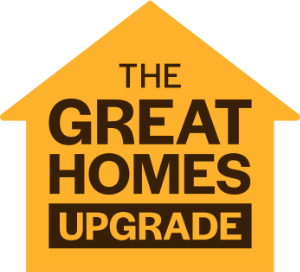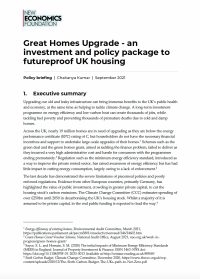Publications Great Homes Upgrade An investment and policy package to futureproof UK housing By Chaitanya Kumar 24 September 2021 Download the report Upgrading our old and leaky infrastructure can bring immense benefits to the UK’s public health and economy, at the same time as helping to tackle climate change. A long-term investment programme on energy efficiency and low-carbon heat can create thousands of jobs, while tackling fuel poverty and preventing thousands of premature deaths
Topics:
New Economics Foundation considers the following as important:
This could be interesting, too:
Robert Vienneau writes Austrian Capital Theory And Triple-Switching In The Corn-Tractor Model
Mike Norman writes The Accursed Tariffs — NeilW
Mike Norman writes IRS has agreed to share migrants’ tax information with ICE
Mike Norman writes Trump’s “Liberation Day”: Another PR Gag, or Global Reorientation Turning Point? — Simplicius
Great Homes Upgrade
An investment and policy package to futureproof UK housing
24 September 2021
Upgrading our old and leaky infrastructure can bring immense benefits to the UK’s public health and economy, at the same time as helping to tackle climate change. A long-term investment programme on energy efficiency and low-carbon heat can create thousands of jobs, while tackling fuel poverty and preventing thousands of premature deaths due to cold and damp homes.
Across the UK, nearly 19 million homes are in need of upgrading as they are below the energy performance certificate (EPC) rating of C, but householders do not have the necessary financial incentives and support to undertake large-scale upgrades of their homes. Schemes such as the green deal and the green homes grant, aimed at tackling the finance problem, failed to deliver as they incurred a very high administrative cost and hassle for consumers with the programmes ending prematurely. Regulation such as the minimum energy efficiency standard, introduced as a way to improve the private rented sector, has raised awareness of energy efficiency but has had little impact in cutting energy consumption, largely owing to a lack of enforcement.

The last decade has demonstrated the severe limitations of piecemeal policies and poorly enforced regulations. Evidence from other European countries, primarily Germany, has highlighted the value of public investment, crowding in greater private capital, to cut the housing stock’s carbon emissions. The Climate Change Committee (CCC) estimates spending of over £250bn until 2050 in decarbonising the UK’s housing stock. Whilst a majority of it is assumed to be private capital, in the end public funding is expected to lead the way.
There is no credible pathway to net zero without energy efficiency and low-carbon heating from electricity, at scale. The Great Homes Upgrade is a package of measures, to be realised in the government’s 2021 spending review and the upcoming heat and building strategy, to put the UK on a rapid and credible pathway to retrofitting 7 million homes by 2025 and almost 19 million by 2030. The package includes:
- Committing to an additional public investment of £11.7bn over the remaining course of this parliament. This investment combines an investment of £7bn in home insulation measures and £4.7bn in installing low-carbon heating solutions (primarily heat pumps).
- Create and fund a national retrofit taskforce with the primary aim of achieving, at least, an average EPC rating of C for all homes by 2030. The taskforce will deliver an area-based retrofit programme in collaboration with local authorities and also coordinate the upskilling and retraining of a large workforce.
- Introduce tax changes in the form of a fiscally neutral, variable stamp duty land tax for more efficient homes, and equalise the VAT treatment for all retrofitting works at 5%, provided the whole property is brought above certain EPC thresholds.
- Strengthen building regulations, including new mandatory energy efficiency works for ‘consequential improvements’, and support new business models and standards to provide ‘whole-house retrofits’ where feasible for millions of homes.
- Ensure domestic state-owned financial institutions such as the UK Infrastructure Bank (UKIB) and the British Business Bank (BBB) offer cheap finance to families and SMEs for upgrading their homes and buildings.
Image: iStock
Campaigns Great Homes Upgrade





